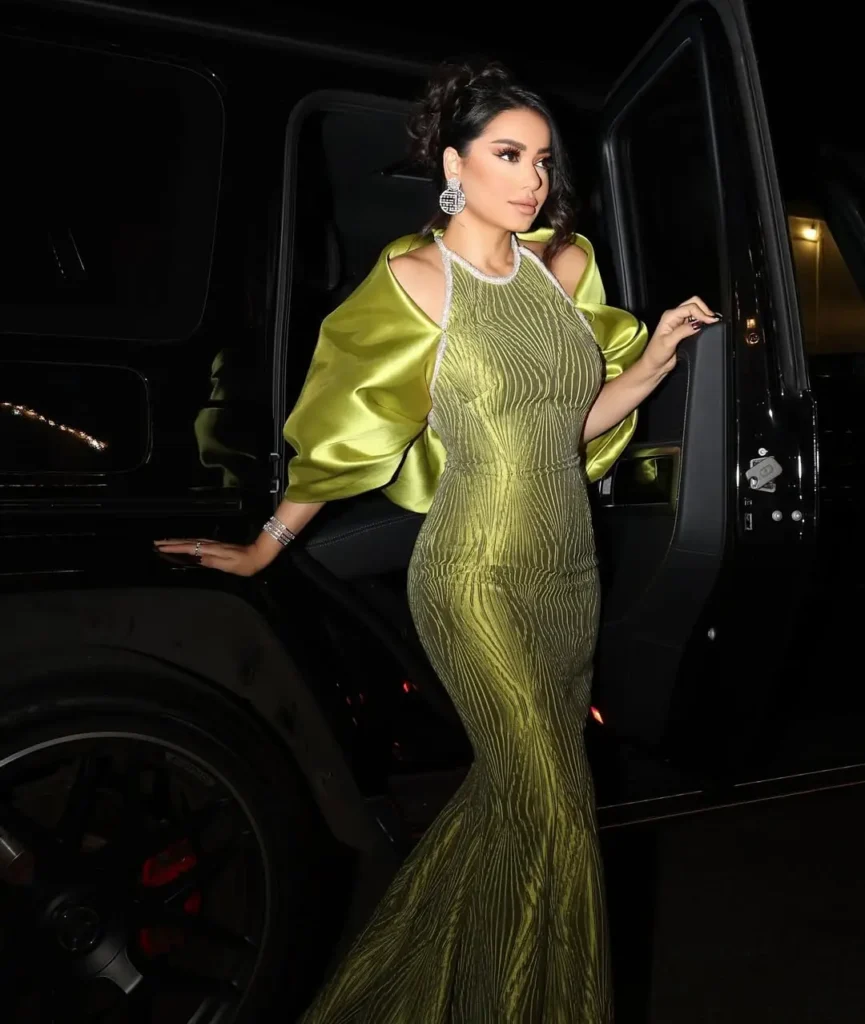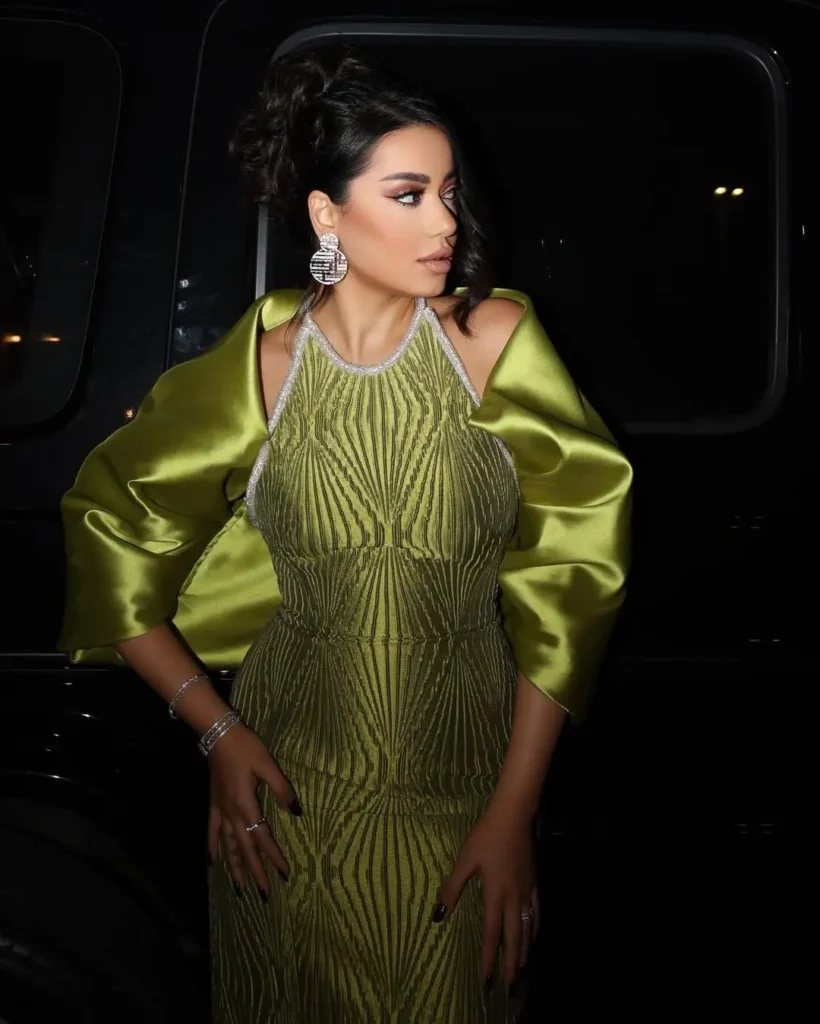Rahma Riad
The Voice of Strength & Emotion In Modern Arab Music
By Peter Davis

In the ever-evolving world of Middle Eastern music, few artists have managed to capture the hearts of millions with the same grace, persistence, and emotional authenticity as Rahma Riad. With a voice that moves effortlessly between soulful vulnerability and commanding strength, Rahma has carved out a unique place for herself in the industry. Her latest release, Min El Akher, marks not just another addition to her discography but a powerful statement of artistic intent. Through music, presence, and resilience, Rahma Riad has become one of the most admired voices of her generation, inspiring audiences across the Arab world and beyond.
Rahma Riad, born Rahma Abdulredha Mezher Al-Sibahi in 1987 in Basra, Iraq, inherited her love of music from her father, the late Iraqi singer Riad Ahmed. From an early age, she was immersed in melodies, rhythms, and the emotional storytelling that defines Arabic music. Watching her father perform and absorbing the artistic atmosphere of her home shaped her identity as an artist. It was clear even in her childhood years that Rahma was destined to follow in his footsteps, but with her own style and vision.
Her first steps into the spotlight came through regional talent shows, most notably Star Academy in 2010. The competition introduced her to a broad audience, and her expressive performances quickly made her a fan favorite. She reached the finals, and while she did not take home the winning title, she left with something far more valuable: recognition, credibility, and a loyal fanbase. That exposure set the foundation for her future career, proving that her potential extended far beyond television screens.
Rahma’s journey after Star Academy was not without challenges. Like many young artists, she had to navigate the complexities of the music industry, balancing commercial expectations with her own artistic instincts. Yet, she demonstrated resilience and clarity of purpose, steadily building her career through carefully chosen songs and collaborations. Her breakthrough came with Waed Menni, a ballad that resonated deeply with audiences. The track, with its heartfelt lyrics and unforgettable melody, went viral, accumulating millions of views and establishing Rahma as a true star. It remains one of her most celebrated works and a turning point in her artistic journey.
Following that success, Rahma diversified her musical style. She experimented with different dialects, explored contemporary pop, and fused her sound with traditional influences. Songs like Athadakom and Al Kawkab showcased her versatility, proving that she could adapt her voice to different genres while retaining her distinctive identity. She became a household name not just in Iraq but across the Gulf, the Levant, and the wider Arab diaspora.


Her appeal lies not only in her music but in her persona. Rahma presents herself as strong yet approachable, glamorous yet grounded. She is a performer who commands attention on stage but also someone who shares her struggles, joys, and reflections openly with her fans. This duality makes her relatable while maintaining her status as an icon. In a region where women in the arts often face heightened scrutiny, Rahma’s ability to stand tall with grace and authenticity has made her an inspiration to many.
Her role as a judge on Iraq Idol further expanded her influence. Taking her place at the judging table, she brought not only credibility but also compassion. Viewers praised her for her sincerity and encouragement toward young talent. In doing so, Rahma stepped into a mentorship role, giving back to the very platform that once propelled her career. This gesture highlighted her belief in nurturing the next generation of artists while reinforcing her position as a cultural leader.
Rahma’s latest release, Min El Akher, carries a deeper meaning than simply being another hit single. The phrase translates to “straight to the point” or “from the end,” and the song reflects a no-nonsense clarity in both its lyrics and delivery. It resonates as a declaration, a refusal to waste words, and a bold assertion of her independence. Through this track, Rahma communicates her strength and honesty, connecting with listeners who appreciate her straightforwardness. The song is not only musically captivating but also symbolic of where she stands today, fearless, self-assured, and unapologetically authentic.
As with much of Rahma’s work, Min El Akher blends artistry with emotion. Her vocal delivery strikes a balance between softness and power, a duality that mirrors the themes of love, truth, and empowerment present in her music. Listeners find in her songs pieces of their own lives, whether it’s heartbreak, resilience, or celebration. This ability to turn personal emotion into a universal experience is what makes Rahma more than just a singer; she is a storyteller of modern Arab life.
Looking ahead, Rahma Riad’s career shows no signs of slowing down. With a loyal fanbase that spans across the Middle East and beyond, she is poised to continue pushing creative boundaries. Her adaptability allows her to thrive in an industry that constantly shifts with new trends, while her grounding in tradition ensures her music maintains a timeless appeal. Potential future collaborations with international artists could broaden her influence further, bringing her voice to global audiences who may be less familiar with Arabic music but are drawn to her universal message of emotion and authenticity.
Rahma Riad is more than an artist; she is a symbol of perseverance, strength, and authenticity. From her beginnings in Basra to her rise as one of the most celebrated female singers in the Arab world, she has proven that success is built on talent, resilience, and the courage to be true to oneself. Her music continues to resonate because it is honest, heartfelt, and deeply human. With Min El Akher adding a new dimension to her story, Rahma stands today as a voice of her generation, inspiring not only through her songs but through the example she sets. As she continues to shape the future of Arab music, Rahma Riad remains a beacon of artistry, empowerment, and emotional truth.





